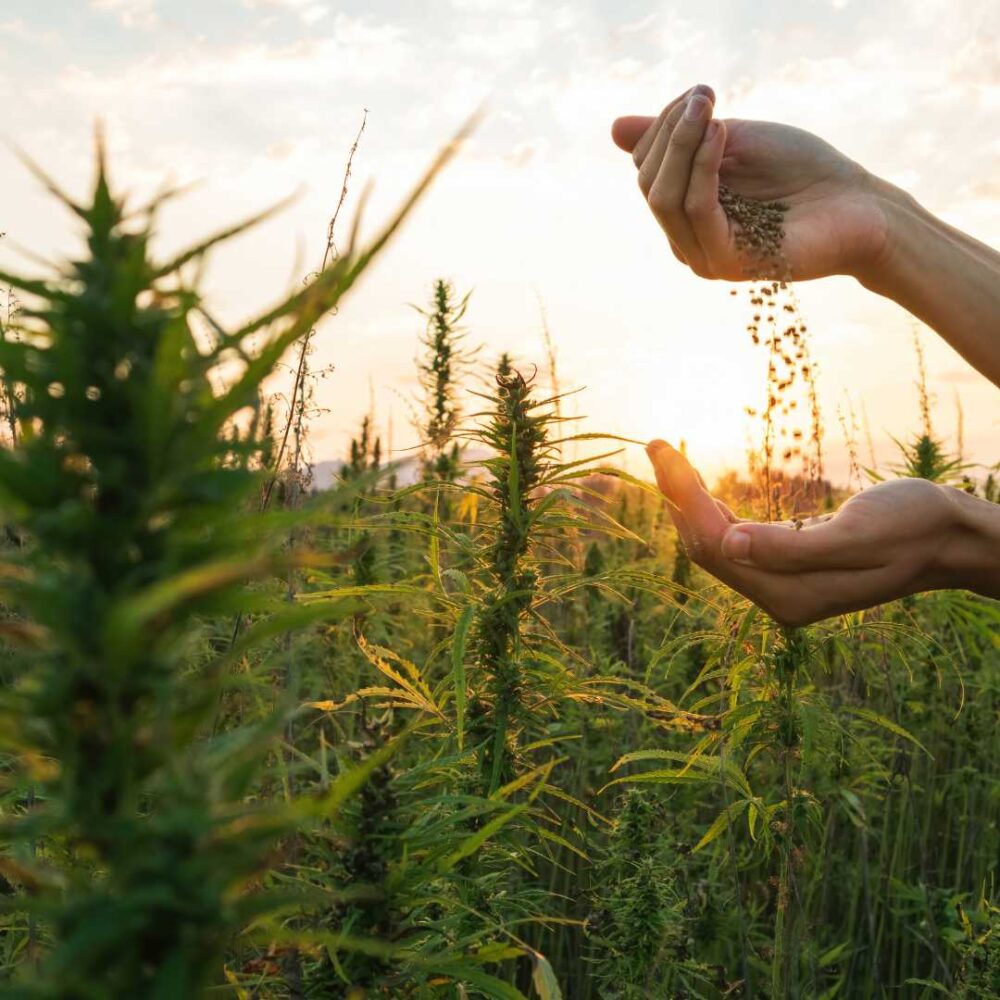
CBD oil is thought to have many different health benefits, but CBD is not known to be addictive. With the exception of THC (tetrahydrocannabinol), hemp cannabinoids such as CBD and CBDA are not thought to be addictive. However, CBD and CBDA may have beneficial properties for helping to treat people who struggle with various addictions.
Sections in this guide:
- What is addiction?
- What are psychoactive compounds?
- Can CBD be used to treat addictions?
- Side effects of CBD oil and can you overdose?
- CBD drug interactions
What is addiction?
National Institute of Drug Abuse defines addiction as a “chronic, relapsing disorder characterized by compulsive drug seeking and use despite adverse consequences.” Most people will know someone or have personally experienced these behaviors in their life, and how they can be debilitating to themselves and those around them.
Signs of addiction may include:
- Inability to stop exposing themselves to environments where the substance is found
- Significant changes in emotional state
- Excessive desire for the drug
- Dismissive about the negative consequences of the substance use
- Health problems, such as excessive weight loss, insomnia and memory loss
It is important to emphasize that THC and CBD are different in that THC has psychoactive effects while CBD does not. While both in combination have been shown to have potential benefits, evidence suggests that CBD does not lead to addictive behaviors. The potential benefits of CBD to mental health have been widely studied both in animal models and in clinical trials, but has not been approved by the FDA (Food and Drug Administration) for these uses.
What are psychoactive compounds?
Are psychoactive compounds addictive? The answer is nuanced, many psychoactive compounds are commonly used, and would not be classified as an addictive drug in most cases (i.e. sugar).
Psychoactive compounds are substances that elicit changes in how the brain works that relate to feelings, mood, awareness and importantly behavior. The definition is fairly broad, and can include everything from caffeine and alcohol, to nicotine, marijuana, and opioids. These substances will range in their addictive potential and ability to negatively affect lifestyle and behavior. People often enjoy coffee, and while excessive consumption can affect sleep, we would not put that in the same category as opioids in their ability to cause significant negative lifestyle changes.
Can CBD be used to treat addictions?
CBD has been used in clinical trials and in vivo models of addiction to help stop and reduce the cravings and anxiety from some addictions. Most of the studies assessing the effects of CBD on addiction have used high dosage amounts, calculated at over 200-800 mg/day for an average person. We believe that CBDA products, which have been found to drive up to 300% higher CBD blood levels, could be an economic alternative to traditional CBD products.
CBD and nicotine addiction
A number of studies assessing the benefits of CBD oil for nicotine has found that it may be beneficial at reducing the cravings in people who use cigarettes. In a small study of chronic smokers, individuals were randomized to use placebo or CBD vape pens for a week. The results found that people who used CBD reduced the amount of cigarettes by 40% on average. Additionally there appeared to lasting effects for the CBD group on follow up, but did not reach significance. Another study testing if CBD could reduce the anxiety and craving cues to cigarettes found that 800mg of oral CBD was able to decrease participants attention to and craving of cigarettes.
CBD and opioid addiction
A growing body of studies have been published attempting to answer the question if CBD has benefits in treating opioid addiction. Opioid addictions, such as heroin and codeine, have been a growing concern in the US and worldwide, with the CDC reporting increasing numbers of overdoses reaching over 75,000 per year in 2021. This 2019 double-blind placebo controlled study in the American Journal of Psychiatry tested 400mg and 800mg of CBD in patients with heroin use disorder to see if they could reduce cravings and anxiety. Patients tested 2 hours and 24 hours after CBD administration had significantly lower cravings and anxiety, with minimal changes at 7 days after treatment. Interestingly, salivary cortisol levels were not increased in CBD treated individuals after drug cue exposure, indicating potential decreases in stress induction with treatment.
In vivo studies have also studied the effects of CBD in reducing cravings in opioid addiction, and associated these changes with gene transcription alterations. These studies (in vivo CBD study, this one on brain receptors, this study using connecting behavior and molecular function) converge on the hypothesis that high doses of CBD (what would be over 200mg/day) can reduce the behavioral changes that animal develop after opioid withdraw. Additionally, CBD is able to modulate critical brain receptors associated with opioid use, such as mu-opioid receptor, proopiomelanocortin, tyrosine hydroxylase, and cannabinoid receptors 1 and 2.
We should note that CBD has not been approved by the FDA for treating opioid addiction.
Side effects of CBD oil and can you overdose?
There are no studies on humans testing the amount of CBD that would be needed to overdose, as this would be highly unethical. The best assessment of CBD tolerance is from epileptic seizure studies, specifically the 2016 publication by Dr. Orrin Devinsky in the Lancet. In patients with intractable, treatment-resistant epilepsy, CBD oil was given at 2-5mg/kg to 25-50mg/kg. For reference, in a 150lb person, this correlates to around 350mg per day on the low end to 3,500mg per day on the high end. At these very high levels, some adverse event were reported, with drowsiness (25% of patients), decreased appetite (19%) and diarrhea (19%) being the most notable. However, the dosing is extremely high, and not something the average consumer would see since typically over-the-counter purchases have servings in the 10-50mg range.
A significant point that should be observed from this epilepsy study is that to obtain health benefits from CBD, higher doses than what is recommended may be necessary. The beneficial properties of a compound are derived from two parameters: 1) the potency of a compound, 2) how well it is absorbed. If the compound is potent, i.e. it has high activity at low amounts, then you don’t need much of it in your system to derive a benefit. However, if the compound is not easily absorbed, then you may need to take a high dose of it just to get a benefit. This is one of the problems with CBD, while it may be somewhat potent, it is not easily absorbed orally.
CBDA has much greater absorption than CBD, over 500% more bioavailable than CBD. Additionally, when taking unheated hemp extract with high CBDA levels, there is 300% more CBD in the blood than when taking a heated hemp extract that contains no CBDA and only CBD. This has significant implications for how much of a cannabinoid product you would need to take to receive a health benefit.
CBD drug interactions
Drug-drug interactions (DDI) is a serious field of study for pharmacists since compound interactions can cause irreversible complications in patients. This can include liver damage, since the liver is largely responsible for metabolizing drugs for clearance, and thus can increase the plasma levels of drugs beyond their intended dose range. Most compounds are metabolized through a pathway called the CYP450, a class of enzymes found in the liver which are responsible for modifying a drug so that it can be secreted by the kidney into the bladder. For example, if a drug is normally metabolized by CYP3A4, and so is CBD, then they will compete for it leading to production of some toxic side compounds and elevated drug levels due to decreased metabolism.
Clinical studies for CBD DDIs has mostly focused on epileptic seizure drugs, since this is the main prescription use for CBD. This study show that CBD and clobazam are both metabolized by the CYP3A4 enzyme, and when taken in concert, exert positive effects on plasma concentrations. Here, clobazam increased in the serum by around 60% on average when taken in combination with CBD. It should be noted that the patients in this trial were taking CBD doses in the hundreds to thousands of mgs per day.
Some common medications for hypertension, migraines, and heartburn may also interact with the same class of enzymes that CBD does (CYP3A4/2C19). The metabolites for CBD after liver first pass is 7-OH-CBD and 7-COOH-CBD, the former being an active metabolite, while the latter is inactive. If you are on any medications, we recommend you see your physician before trying CBD.

Summary
The main cannabinoid in the hemp plant, CBD, has many potential benefits, but is not typically associated with psychoactive effects like its cousin THC. Mental health benefits of the cannabis plant are thought to derive mainly from its interaction with the endocannabinoid system, but which components the cannabinoid targets within this system determine whether there are psychoactive effects and if there will be addictive behaviors.
Researchers have started testing the ability of CBD to treat addictive behaviors, specifically opioid and nicotine withdrawal symptoms, and may be used more widely in the future as further studies assess its efficacy. However, the body of studies on CBD to decrease addiction symptoms is still limited, and most likely will require larger studies to determine how effective cannabis cannabinoids are in this use.
Let us know what you think and if you have any suggestions for articles you would like to see.
FAQ - Can you get addicted to CBD?
CBD is not psychoactive, meaning it does not produce a "high". You cannot get addicted to CBD and it is not habit forming. While it is found in marijuana plants, it is the THC that be habit forming. If you are concerned about cannabinoid addiction, you can look for products that contain only CBD.
CBD has very little side effects at low to moderate doses (such as 20-100mg). Also, CBD is not psychoactive, not addictive, so you don't have to worry about developing a habit. You should speak with a health care provider if you are on multiple medications since high doses of CBD may increase liver enzymes in some cases.
No, CBD does not have withdrawal affects commonly associated with some addictive substances. CBD is not considered addictive since it does not have psychoactive effects. However, if taken with THC, there could be withdrawal effects but this is from the THC cannabinoid and its psychoactive properties.
No, CBD does not have addictive properties. While some people may be consistent users of CBD for help with sleep, removing CBD does not elicit withdrawal effects. We should note that CBD taken with THC could become addictive due to the psychoactive nature of THC itself.

